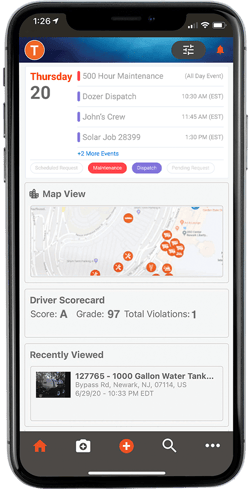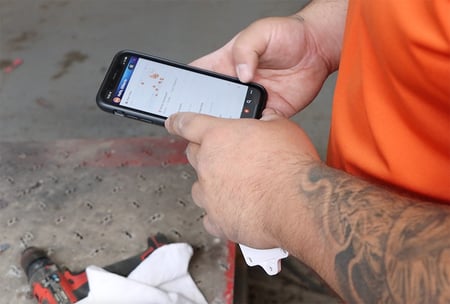
Many companies in the construction industry are trying to decide if they should continue with their paper-driven processes for managing their information or switch to using mobile devices in the field to digitize their information. While it might be tempting to wait to implement a mobile strategy, strong evidence is showing that construction companies that leverage technology to sync their information to the cloud are outperforming their competitors; digitization allows workers on job sites to effectively communicate with their team members and quickly make decisions, among numerous other benefits and efficiencies, all saving both time and resources.

A Mobile Strategy Can Help with Modernization and Attract Talent
The norm is quickly becoming that all companies must have a mobile strategy, and now. Given that nearly everyone in the field (both young and old) is comfortable using and carrying a mobile device with them, transitioning to a digital program is much more acceptable and, in many cases, expected. This digital cultural shift allows companies to better support their employees and solve many of the problems they face in the field. A mobile strategy helps the construction industry modernize and attract younger talent that would otherwise be repelled and frustrated by non-digital methods for managing and accessing information in today’s digital age.
Cloud-based Apps Allow for Quick Information Exchange and Increased Jobsite Productivity
Construction enterprises are catching up with the trends that embrace digitization and their employees are starting to demand more simplicity and easier ways of collecting and analyzing data when reporting information. Jobsite employees prefer to be able to quickly transfer and manage information digitally rather than use outdated paper methods, which are often slower, less accurate and accessible, and often result in increased man-hours spent on manual processes. The beauty of a mobile strategy is that most equipment management apps are compatible with many types of mobile devices (such as smart phones, tablets, etc.), are cloud-based where information can be easily transferred and actioned-upon, and the learning curve to use the apps is often very short, with intuitive and user-friendly navigation. It is now possible for the field to send and retrieve information within seconds – rather than hours – and accurately solve problems on the fly.
App-Driven Technology Offers Advantages Over Single-Use Hardware and Data Collection
Today’s trend is moving away from single-use hardware for data collection (such as bar code reading guns) to app driven technology (such as a QR code scanner on a phone). It is important to choose a program (or app) that can truly be used by all team members to keep everyone connected versus having to manage several, separate solutions and systems for multiple users and use cases. The strength of a well-constructed app is that as industry problems and solutions emerge, changes to the app software can be seamlessly developed and integrated, particularly with partner software, and users will always have the most-up-to-date version because the integrated construction software is cloud-based. A cloud-based, app-driven approach allows for continual innovation and is a nimble solution that can adapt to needs of the industry.
Devices: The Decision to Supply Corporate Devices, Allow BYOD or use a Mix of Both
Many companies wonder whether they should supply corporate mobile devices (such as smart phones, tablets, etc.) to their workforce or allow their workforce to use their own personal devices (BYOD – Bring Your Own Devices). Navigating this decision can often slow down and sometimes stop some companies in their tracks, preventing them from implementing a mobile strategy. Luckily, there is no magic “right way.” Businesses have had success with all three scenarios - by supplying their workforce with devices, embracing a BYOD policy, or using a mix of both.
A few highlights of the advantages and challenges of corporate-supplied devices and BYODs.
| Device Supply Method | Advantages | Challenges |
| Corporate Supplied |
|
|
| BYOD (Bring Your Own Device) |
|
|
| Mix |
|
|
Communication is Key to the Success of Your Mobile Strategy
After you’ve decided on how you will implement your mobile strategy internally (corporate-provided devices, BYOD or combo), you’ll want to roll it out clearly and smoothly to your team. When introducing a mobile strategy, it is important to communicate to employees the problems digitization will solve – the last thing the field wants is new software that they don’t know how to use, doesn’t integrate well with their other programs and slows them down. App solutions that offer training and are intuitive/user-friendly (for users with limited digital experience) will quickly increase the adoption and acceptance rates.
An Effective Mobile Strategy in Practice
There are extensive benefits to leveraging technology with a mobile device for users in the field. A single-source platform for equipment management is a great example of using a mobile, cloud-based technology to connect teams. The ability to sync to the cloud allows users to quickly find the information they need and relay information back to their team members on other jobsites or in the shop or main office, and vice versa.
One Platform Combines Information for:
- Tracking and Scanning in Assets - for comprehensive, mixed fleet management, theft prevention and adjusting consumable inventory locations and quantities
- Equipment Maintenance Management - for submitting maintenance requests, preventive and routine service, work orders, fault codes, diagnostic trouble codes, repair reports, etc.
- Resource Management – for submitting asset and labor or crew requests for scheduling and dispatching
- Asset Management – for monitoring sites, location, utilization, analytics, notifications, etc.
- Integrations – for leveraging the visibility and transfer of data with other systems you rely on such as accounting, project management software
- Safety and Compliance Needs – for DVIR and other inspections, driver scorecards and more
Trying to Decide Which App to Pick?

When selecting a construction app for your Mobile Program, look for the following characteristics to ensure security and easy adoption:
- Open-source formatting (works well with other software and can be easily modified by IT)
- Dual Authentication Capabilities (preferably without requiring an email, as many field users may not have a corporate email and do not want to use their personal email)
- Excellent Security Capabilities - cloud-based solutions make it easier to ensure all users have the same, up-to-date version You can rest a little easier when you trust that you are using programs and apps that sync to the cloud that provide many security benefits. Single platform, integrated app software allows for increased security measures as access to multiple points of entry have been eliminated.
- Easy-to-Use Dashboards, Reports and Interfaces
- Construction Focus– built by those that know the industry to solve real problems faced by workers in the field and office with realistic and effective equipment management solutions
- Intuitive, easy to navigate screens
A Mobile Strategy to Fit Your Technology and Digitalization Needs
Whether in the field, shop or office, users can easily collect, process and analyze data to quickly make more informed decisions. A mobile strategy leads to increased visibility for all and increases communication between teams, employee effectiveness and productivity, and improved project and company cost of earnings and savings. A well-designed construction app allows companies to have the ability to track and manage their entire mixed fleet while having integrating information with their other business systems.
Tenna Solutions – Built by Construction Experts for Construction Experts
Tenna’s products and services are purposefully developed for the construction industry and offer cohesive hardware and software solutions that allow users to easily find the information they need, when they need it, at their fingertips. We work closely with our valued partners to develop innovative solutions that meet the industries’ needs, both for today and tomorrow.
For information about Tenna’s Mobile App, contact us today.
About Russ Young
As Chief Business Development Officer for Tenna, Russ oversees the growth strategy for the organization by working with sales, partners and customers to ensure success. Russ brings two and a half decades of experience from Google, Amazon, Oracle and FMI in best practices for technology strategy, selection and adoption. He applies his knowledge from these organizations to build awareness and provide thought leadership to the construction industry. He emphasizes the importance of technology and picking the right tool for the job.
